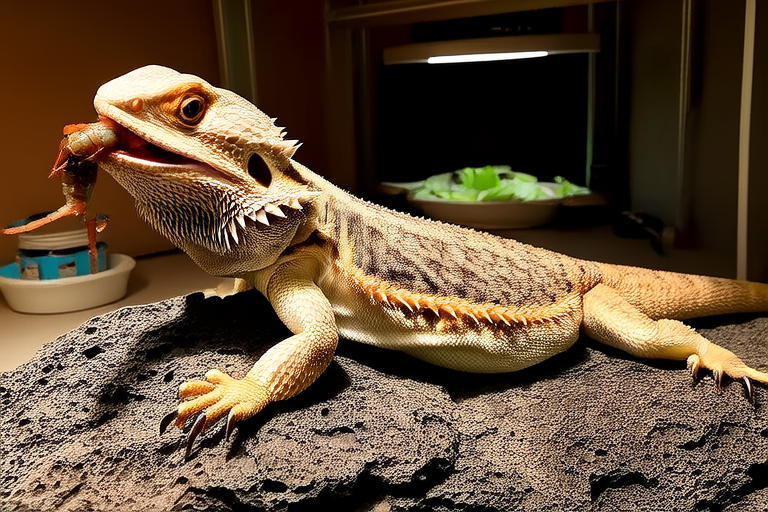Secrets to Feeding Your Bearded Dragon Like a Pro
Welcome to the world of bearded dragon care! These fascinating reptiles have become increasingly popular pets, and it’s no wonder why. With their charming personalities and relatively low maintenance, they make great companions for both novice and experienced reptile owners. However, one crucial aspect of bearded dragon care that often requires careful attention is their diet. In this comprehensive guide, we’ll explore the secrets to feeding your bearded dragon like a pro, ensuring they thrive and maintain optimal health.
Understanding the Balanced Diet Composition
A well-balanced diet is the cornerstone of any bearded dragon’s health. Their diet should consist primarily of a mix of vegetables, fruits, and insects. The ideal ratio for adult bearded dragons is about 80% plant matter and 20% protein from insects. For younger dragons, this ratio should be adjusted to around 50% plant matter and 50% protein as they require more protein for growth.
Frequency of Feeding
The frequency at which you feed your bearded dragon depends on its age. Younger dragons, up to six months old, need to be fed daily. As they grow older, the frequency can decrease to every other day for juveniles and once every three days for adults. Always monitor your dragon’s body condition to adjust feeding schedules as needed.
The Importance of Hydration
Hydration is critical for your bearded dragon’s overall health. Provide fresh water daily in a shallow dish that is easy for them to reach. Some dragons may not drink from standing water, so misting them with a spray bottle can help encourage drinking. Additionally, ensure that the vegetables and fruits you offer are fresh and juicy, contributing to their hydration needs.
Types of Vegetables and Fruits Suitable for Bearded Dragons
Vegetables should form the bulk of your bearded dragon’s diet. Safe options include collard greens, mustard greens, dandelion greens, turnip greens, and beet greens. Occasional treats of fruits such as strawberries, blueberries, and mangoes can be offered but should be limited due to their sugar content.
Types of Insects Suitable for Bearded Dragons
Insects provide essential proteins necessary for growth and maintenance. Crickets, dubia roaches, and mealworms are commonly used. However, avoid super worms and wax worms, as they are high in fat and should only be given sparingly as treats.
Calcium and Vitamin D3 Supplementation
Bearded dragons require adequate amounts of calcium and vitamin D3 to prevent metabolic bone disease (MBD). Dusting insects with a calcium supplement without vitamin D3 three times a week and a calcium supplement with vitamin D3 once a week is recommended. Ensure you follow the manufacturer’s instructions for dosage.
Gut-Loading Techniques for Feeder Insects
Gut-loading involves feeding the insects a nutritious diet before offering them to your bearded dragon. This enhances the nutritional value of the insects. Offer insects a variety of nutritious foods such as commercial gut-load products, carrots, sweet potatoes, and leafy greens. Allow the insects to digest these nutrients for at least 24 hours before feeding them to your dragon.
Proper Handling and Hygiene When Preparing Food
Always wash your hands thoroughly before handling your bearded dragon or preparing their food. Use clean utensils and surfaces to prepare food, and store uneaten portions properly to prevent spoilage. Avoid cross-contamination by keeping reptile food separate from human food.
Common Feeding Mistakes to Avoid
- Overfeeding: Excessive feeding can lead to obesity and other health issues. Stick to the recommended feeding schedule.
- Feeding inappropriate insects: Avoid insects that are too large for your dragon to eat or those that might be harmful.
- Ignoring hydration: Ensure your dragon has access to fresh water at all times.
- Lack of variety: A varied diet ensures your dragon receives all necessary nutrients.
Signs of Malnutrition or Overfeeding
Malnutrition can manifest in various ways, including lethargy, loss of appetite, weight loss, and deformities. Conversely, overfeeding can result in obesity, difficulty moving, and increased risk of health problems. Regular vet check-ups and monitoring your dragon’s body condition can help identify these issues early.
Advice on Transitioning Young Dragons to Adult Diets
Young dragons require a higher proportion of protein for growth. Gradually transition them to an adult diet by increasing the amount of plant matter and reducing the number of insects as they grow. Monitor their weight and activity levels closely during this transition to ensure they remain healthy.
Conclusion
Feeding your bearded dragon correctly is vital for their health and longevity. By understanding the importance of a balanced diet, proper feeding frequency, hydration, and supplementation, you can ensure your dragon thrives. Remember, each bearded dragon is unique, so tailor their diet to meet their specific needs. With the right approach, you can enjoy a long and happy partnership with your scaly friend.
